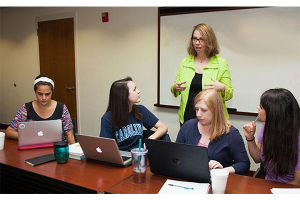For media law professor, MATC course recalls professional roots

Tori Ekstrand will teach her first UNC Master of Arts in Technology and Communication course next semester, but she is quite comfortable—and experienced—leading professional communicators and online learners.
Ekstrand, an assistant professor in the UNC Hussman School of Journalism and Media and former director of corporate communications for The Associated Press, will teach JOMC 718: “Media Law for the Digital Age” for second-year MATC students.
“My media law interests were born in my time in corporate communications at the AP,” explained Ekstrand, who earned a master’s degree from New York University while serving as director. “I did my master’s while I was working, so I have a good sense of what it’s like to be a student and professional at the same time.”
A 2003 UNC Hussman School doctoral graduate, Ekstrand has a dozen years of professorial experience to go with 12 years as a professional, starting as a broadcast journalist. She first taught online during her time at Bowling Green State University. She returned to Carolina in 2012 and teaches media law to residential graduate and undergraduate students.
Ekstrand’s research explores conflicts between copyright law and the First Amendment, particularly as they arise in journalism and social media. Her work is often grounded in critical legal theory, in which she examines the impact of law and policy on culture and media production. She has begun investigating online accessibility for the disabled as a First Amendment issue. She has also written about legal protections for anonymous speech online.
Ekstrand is an expert on the hot news doctrine, a part of unfair competition law that protects the facts of news for a short period. Her recently published, revised book on the subject, “Hot News in the Age of Big Data: A Legal History of the Hot News Doctrine and Implications for the Digital Age” (LFB Scholarly), looks at the history of the doctrine and its impact on protections for discrete bits of information in the age of Big Data. (Full bio)
JOMC 718 examines the application of tradition media law to new communication technology. Ekstrand’s research in copyright law and in accessibility provides example material for class lessons, and she expects her MATC students’ research to reflect their work experiences.
“There isn’t a corporate communicator out there who hasn’t run into a media law issue in this climate,” Ekstrand said. “This is why the study of media law has become so crucial.”